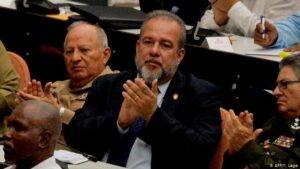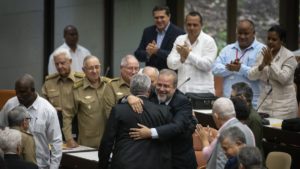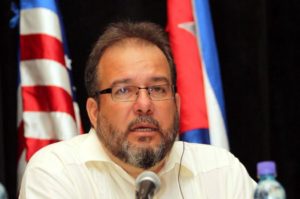 TRAS 40 AÑOS SIN PRIMER MINISTRO CUBA ELIGE A UN POLITICAMENTE DESCONOCIDO AL NUEVO CARGO.
TRAS 40 AÑOS SIN PRIMER MINISTRO CUBA ELIGE A UN POLITICAMENTE DESCONOCIDO AL NUEVO CARGO.
Manuel Marrero, el ministro cubano que más tiempo ha permanecido en su cargo, se convirtió este sábado en la mano derecha del presidente Miguel Díaz-Canel al ser designado primer ministro, un cargo eliminado hace más de 40 años y recuperado ahora por la nueva Constitución.
El hasta ahora titular de Turismo, de 56 años, fue el único candidato propuesto por Díaz-Canel ante el Parlamento. Su nombramiento tomó por sorpresa y desbarató todas las quinielas, donde ni siquiera aparecía como posible aspirante al puesto, creado para descargar al jefe de Estado de funciones ejecutivas internas.
Arquitecto de profesión, el veterano funcionario es uno de los pocos “sobrevivientes” de larga data en las altas esferas del Ejecutivo cubano y el único ministro de la Revolución que ha visto pasar a tres presidentes diferentes.
Elegido por el fallecido Fidel Castro en 2004, Marrero fue ratificado por Raúl Castro cuando relevó a su hermano mayor en la presidencia (2006-2018), y luego por Miguel Díaz-Canel cuando éste asumió la jefatura del Estado en abril de 2018. Díaz-Canel resaltó su “honestidad, capacidad de trabajo y fidelidad al Partido (Comunista, único legal) y a la Revolución”, al proponer su candidatura ante el Parlamento, que la aprobó por unanimidad.
El mandatario cubano también destacó la “rica experiencia en negociación con contrapartes extranjeras” y su gestión acertada al frente de la cartera de Turismo, sector considerado el motor de la economía cubana y la segunda fuente de ingresos para la isla, solo detrás de la exportación de servicios profesionales. En ese sector desde 1990, Marrero comenzó a ascender poco a poco desde la base, como el propio Díaz-Canel. Pasó de ser gestor de las inversiones del grupo militar Gaviota en la construcción de hoteles en la provincia de Holguín (este), a dirigir instalaciones turísticas estatales en Varadero, el principal polo de sol y playa del país.
En 1999 fue nombrado vicepresidente de Gaviota y dos años después ya dirigía la cadena, una de las entidades más importantes del todopoderoso conglomerado militar Gaesa.
Carismático, elocuente y accesible, Marrero tiene una presencia frecuente en los medios de comunicación de la isla -todos estatales-, algo poco usual para un ministro cubano.
Tras el viraje en la política de Washington hacia la isla, el endurecimiento de las restricciones de viajes y las nuevas medidas dirigidas a dañar el turismo cubano, Marrero se encargó él mismo de liderar las delegaciones del país a eventos y ferias para promover el destino Cuba por todo el mundo.
Como el resto de los altos cargos cubanos, que acostumbran a mostrar su cara profesional sin dar demasiados detalles personales, mantiene su vida privada alejada de los focos. Es diputado de la Asamblea Nacional del Poder Popular (Parlamento unicameral) por el municipio de Gibara, en Holguín, y miembro del Partido Comunista de Cuba.
Su experiencia y conocimiento del sistema desde dentro le servirán al veterano funcionario en su nuevo cargo de representante del Gobierno encargado de coordinar el Consejo de Ministros y de gestionar las cuestiones internas del país en nombre del presidente.
 AFTER 40 YEARS WITHOUT PRIME MINISTER CUBA CHOOSES A POLITICALLY UNKNOWN TO THE NEW POSITION.
AFTER 40 YEARS WITHOUT PRIME MINISTER CUBA CHOOSES A POLITICALLY UNKNOWN TO THE NEW POSITION.
Manuel Marrero, the Cuban minister who has remained in his post for the longest time, became President Miguel Díaz-Canel’s right hand on Saturday when he was appointed prime minister, a position eliminated more than 40 years ago and now recovered by the new Constitution.
The hitherto head of Tourism, 56, was the only candidate proposed by Díaz-Canel before Parliament. His appointment took by surprise and broke all the pools, where he did not even appear as a possible candidate for the position, created to discharge the head of state of internal executive functions.
An architect by profession, the veteran civil servant is one of the few long-standing “survivors” in the high spheres of the Cuban Executive and the only minister of the Revolution who has seen three different presidents pass by.
Elected by the late Fidel Castro in 2004, Marrero was ratified by Raúl Castro when he relieved his older brother in the presidency (2006-2018), and then by Miguel Díaz-Canel when he assumed the leadership of the State in April 2018. Díaz -Channel highlighted his “honesty, ability to work and fidelity to the Party (Communist, only legal) and the Revolution” when proposing his candidacy before Parliament, which approved it unanimously.
The Cuban president also highlighted the “rich experience in negotiation with foreign counterparts” and his successful management at the head of the Tourism portfolio, a sector considered the engine of the Cuban economy and the second source of income for the island, only behind the export of professional services. In that sector since 1990, Marrero began to ascend gradually from the base, like Díaz-Canel himself. He went from being an investment manager of the Gaviota military group in the construction of hotels in the province of Holguín (east), to direct state tourist facilities in Varadero, the main sun and beach pole in the country.
In 1999 he was appointed the vice president of Gaviota and two years later he was already leading the chain, one of the most important entities of the almighty Gaesa military conglomerate.
Charismatic, eloquent and accessible, Marrero has a frequent presence in the island’s media – all state – something unusual for a Cuban minister.
After the turn in the policy of Washington towards the island, the tightening of travel restrictions and the new measures aimed at damaging Cuban tourism, Marrero himself was responsible for leading the country’s delegations to events and fairs to promote the destination Cuba all over the world.
Like the rest of Cuban senior officials, who usually show their professional face without giving too many personal details, keeps their private life away from the spotlights. He is a deputy of the National Assembly of Popular Power (unicameral Parliament) by the municipality of Gibara, in Holguin, and a member of the Communist Party of Cuba.
His experience and knowledge of the system from within will serve the veteran official in his new position as representative of the Government in charge of coordinating the Council of Ministers and managing internal affairs of the country on behalf of the president.
Agencies/ El Español/ Yeni García/ Internet Photos/ Arnoldo Varona/ www.TheCubanHistory.com
THE CUBAN HISTORY, HOLLYWOOD.








